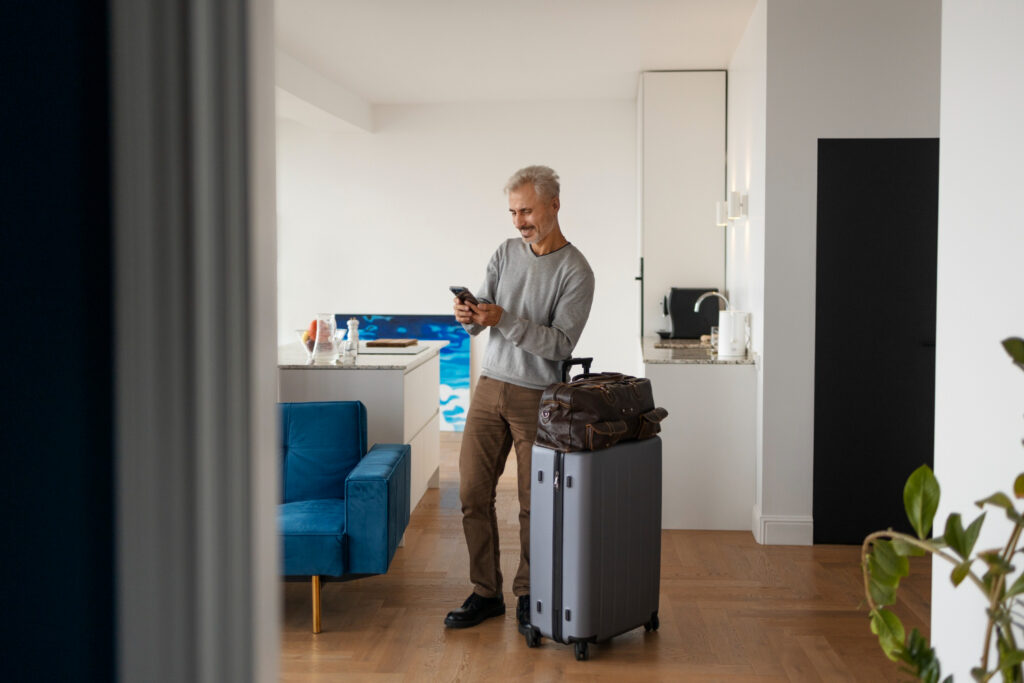In the competitive hospitality industry, communication skills are as important as a fine stay. Guest communication isn’t just about being polite; it’s about making sure your guests have a smooth and enjoyable experience from start to finish. Connecting with visitors and giving them a personalized stay can really make a difference in your business.
Picture a guest who arrives at your apartment with a genuine smile, feeling certain of their choice of accommodation, and returns home with memories to cherish. This is the goal every host should aim for. In this guide, we’ll share our top tips to enhance your digital and verbal communication skills to take your short-term rental game up a notch. Let’s dive in!

Pre-Arrival instructions
1. Share important details
Before your guests even step through the door, provide them with clear instructions, such as directions to your property, check-in procedures, and any necessary codes or keys. Try not to leave this for the last minute, as guests want to feel secure that their check-in process will go smoothly. Also, avoid jargon or overly complex instructions. Simple, direct language is key.
2. Set expectations
Let guests know what they should expect upon arrival. Make it clear if there’s a specific check-in time, parking instructions, or a key pickup procedure. This prevents confusion and sets a positive tone for their stay. Moreover, if you have any house rules for parties, smoking, or additional guests, let people know in advance so they stay on the same page.
3. Provide local tips
Help visitors make the most of their journey by sharing information about nearby attractions, restaurants, or essential services like grocery stores and pharmacies. Providing a helpful guide, whether printed or digital, makes it easy for guests to find all the information they need. This shows you’re a caring and thoughtful host and showcases professionalism.

During-stay support
1. Remain available
Don’t help guests check in and then disappear from the face of the earth. Being available when issues arise is critical to good communication. Ensure you have a system in place to address concerns promptly. Guests appreciate quick response times through phone or messaging platforms.
2. Check-in periodically
Regularly check in with your guests without being intrusive to ensure everything is going smoothly. A quick message asking if they need anything can go a long way in making them feel valued and supported.
3. Provide solutions, not excuses
When issues arise, focus on providing solutions rather than explanations or excuses. For example, if there’s a problem with the Wi-Fi, offer to send someone to fix it or provide a temporary workaround. Active listening and meeting guest expectations can go a long way.

Post-departure feedback
1. Request feedback promptly
Reach out to guests shortly after their departure to request feedback. Timing matters because you want to capture their reviews while their memories of the stay are still fresh. It shows you care about their experience and are always looking to improve. Plus, positive reviews can rapidly grow your hospitality business.
2. Make it easy
Don’t overcomplicate collecting guests’ feedback. A short survey or a simple email asking for their thoughts can be effective. Avoid lengthy questionnaires that might deter guests from responding.
3. Act on feedback
When guests provide feedback, acknowledge their input and, if applicable, inform them of any changes you plan to make based on their suggestions. This shows that you value their opinions and are dedicated to improving your service.

Tips for all phases of guest communication
1. Maintain professionalism
Even in challenging situations, keep your tone professional and courteous. This will protect your reputation and ensure you handle even negative experiences gracefully. From verbal communication to body language, each approach counts toward a better guest experience.
2. Personalize communication
Address your guests by their first names to break the ice. This will make interactions seem more genuine and less transactional. It also shows that you care about providing a fantastic stay. Try to refer to specific details about their stay, such as their special requests or preferences, showing you’re attentive. As a result, you’ll build lasting connections, which might result in repeat visitors and positive reviews.
3. Be proactive
Identify potential issues early and resolve them before they escalate. For example, if you know your guests have allergies, provide information about nearby pharmacies or have a list of emergency numbers available. You might also ask if they need any special accommodations in advance, such as allergen-free bedding or air purifiers.
4. Stay organized
Effective communication requires the right systems in place. To keep things running smoothly, make sure you have a reliable method for tracking guests’ requests, preferences, and feedback. For instance, if a guest mentioned a preference for extra pillows or a specific room setup, note it down to accommodate their needs. A property management system like Hosthub can help record and access this information efficiently.
5. Train your staff members
Get your whole team on the same page when handling different guest interactions. From addressing complaints to delivering special requests, everyone must know what they’re doing. Emphasize the importance of professionalism and critical thinking skills. The more confidence you instill in your staff, the better the communication will be.
6. Provide timely updates
No one likes to be kept waiting, so ensure your guests receive timely responses. You should inform them of any last-minute changes during their stay, such as maintenance issues, a change in check-out times, or local events in the area. This will help avoid misunderstandings and show you’re an attentive host.
7. Use automation
As a host, juggling multiple responsibilities can be overwhelming. Incorporating technology into your workflow can significantly ease this burden. Automation tools, like Hosthub’s AI assistant, can streamline operations by generating quick, accurate, and personalized responses to incoming messages within seconds. It can confirm reservation details, provide directions, address specific guest requests, handle complaints, and much more. This not only saves you time but also ensures your guests receive exceptional communication.
8. Leverage multichannel communication
Different guests come from different communication channels, such as Airbnb, Vrbo, or your book-direct website. As a responsive host, you should be available to all of them to ensure guests can reach out in a way that’s most convenient for them. Hosthub’s Unified Inbox centralizes all communication in one dashboard, enhancing coordination and efficiency. By enabling inbox notifications, you can rest assured you’ll never miss a message from your guests.

Guest communication: the bottom line
Communication in the hospitality industry is vital for a stellar stay. From the moment guests book their stay until after they’ve checked out, they expect seamless contact with their host. Ultimately, it’s all about creating a welcoming, stress-free experience by being proactive and empathetic.
Tools like Hosthub AI assistant can help you automate routine messages, such as confirming bookings, providing directions, handling complaints, or addressing user-specific requests. Located within the Unified Inbox dashboard, it helps hosts save time, reduce manual errors, and provide instant responses. Try the AI assistant Beta and scale your business seamlessly.



